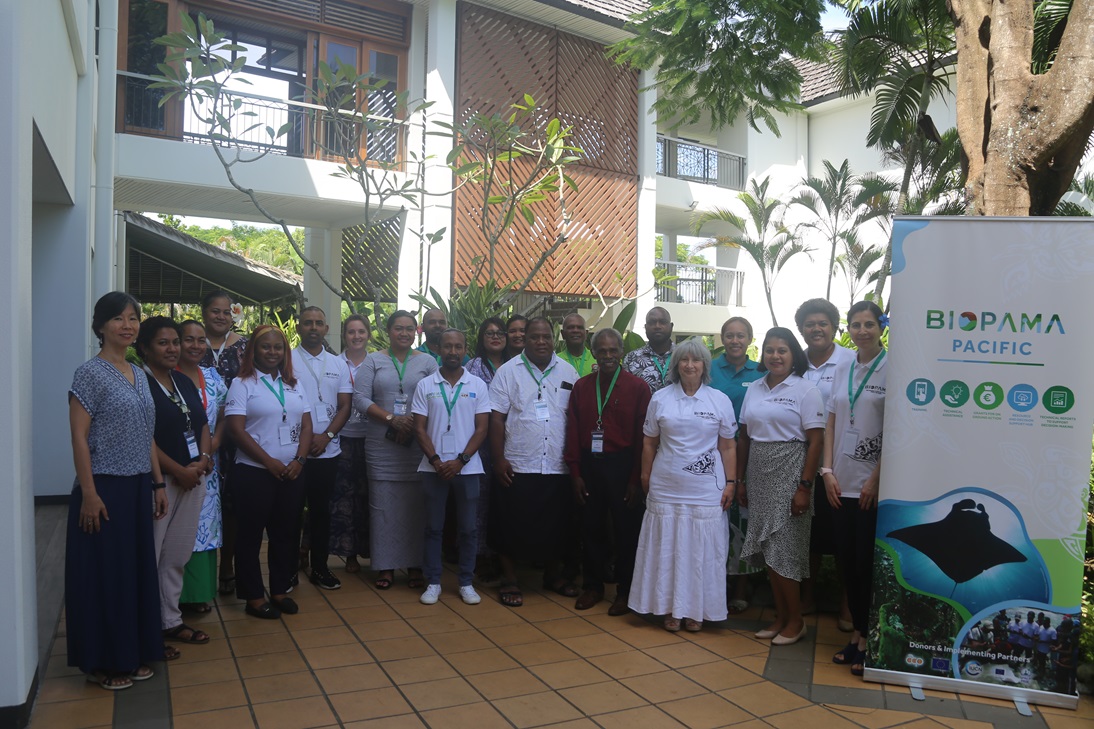In her welcoming address, Regional Director of IUCN Oceania Leituala Kuiniselani Toelupe Tago welcomed the participants emphasizing the significance of collaboration in addressing pressing environmental challenges. She highlighted the triple planetary crisis of climate change, biodiversity loss, and pollution, stressing the pivotal role of the Pacific region in confronting these issues.
Acknowledging the generous contributions of the European Union through the Biodiversity and Protected Areas Management (BIOPAMA) Programme, Regional Director Tago expressed gratitude for the support provided over the past decade. She underscored BIOPAMA’s role in empowering conservation actors and enhancing the management and governance of biodiversity and natural resources across African, Caribbean, and Pacific countries.
“The work of BIOPAMA, funded by the European Union and the Organisation of African, Caribbean and Pacific States, stands as a beacon of collaboration and support in addressing pressing environmental challenges”, Director Tago highlighted.
Throughout the years, BIOPAMA has made significant strides in fostering conservation and sustainable use of biodiversity in the Pacific. By facilitating access to crucial data and information, the program has empowered stakeholders to make informed decisions and strengthen conservation efforts at regional, national, and local levels.
Central to BIOPAMA’s strategy are the Regional Observatories for protected and conserved areas, which serve as hubs for collaborative conservation efforts. In the Pacific region, the observatory is hosted by the Secretariat of the Pacific Regional Environment Programme (SPREP), facilitating monitoring and reporting on the status of biodiversity and protected areas.
Moreover, BIOPAMA’s grant programme has investments totalling over 3 million Euros in nine(9) countries, and seventeen (17) grants, including Government organisations of the Pacific Island States, small community organisations, and local and international NGOs. Through the implementation of the grants, the programme aims to strengthen and enhance the management, governance, and effectiveness of protected and conserved areas and natural resources through various means, including capacity development, training, resource mobilisation, and outreach and education. Overall, the BIOPAMA programme has played a vital role in supporting conservation actions in priority landscapes across Oceania.
In her opening remarks, Ms Andreja Vidal, Programme Manager at the Delegation of the European Union for the Pacific, addressed and encouraged the grantees who were part of the training, “Today’s event is a very important step in preparing the legacy of BIOPAMA and in promoting the successes achieved.’’ “One defining aspect of actions supported under BIOPAMA has been the value of a bottom-up approach, where IUCN facilitates the implementation, and you – the grantees decide what actions are relevant and needed.” Ms Vidal said.
The BIOPAMA Grantee Training and Project Success Workshop provided a platform to highlight accomplishments, identify best practices, and enhance the capacity of grantees in the Pacific. Through comprehensive training sessions on financial management, project monitoring and reporting, and communications, participants have gained the necessary skills to maximize the impact of their projects and ensure long-term sustainability.
The week-long training included a field trip where participants visited a Ramsar site, the Upper Navua River and Fiji’s natural heritage. Some participants visited the Sigatoka Sand Dunes National Park, managed by the National Trust of Fiji, who is one of the BIOPAMA grantees. With their BIOPAMA grant, the National Trust of Fiji conducted a management effectiveness assessment and purchased equipment for the park rangers.
See this video testimonial about this work.
The training represented a significant step forward in strengthening conservation efforts and fostering collaboration across the Pacific. With a commitment to partnership, innovation, and action, attendees are poised to make meaningful contributions towards safeguarding the biodiversity and natural heritage of the region.
Links:
link

